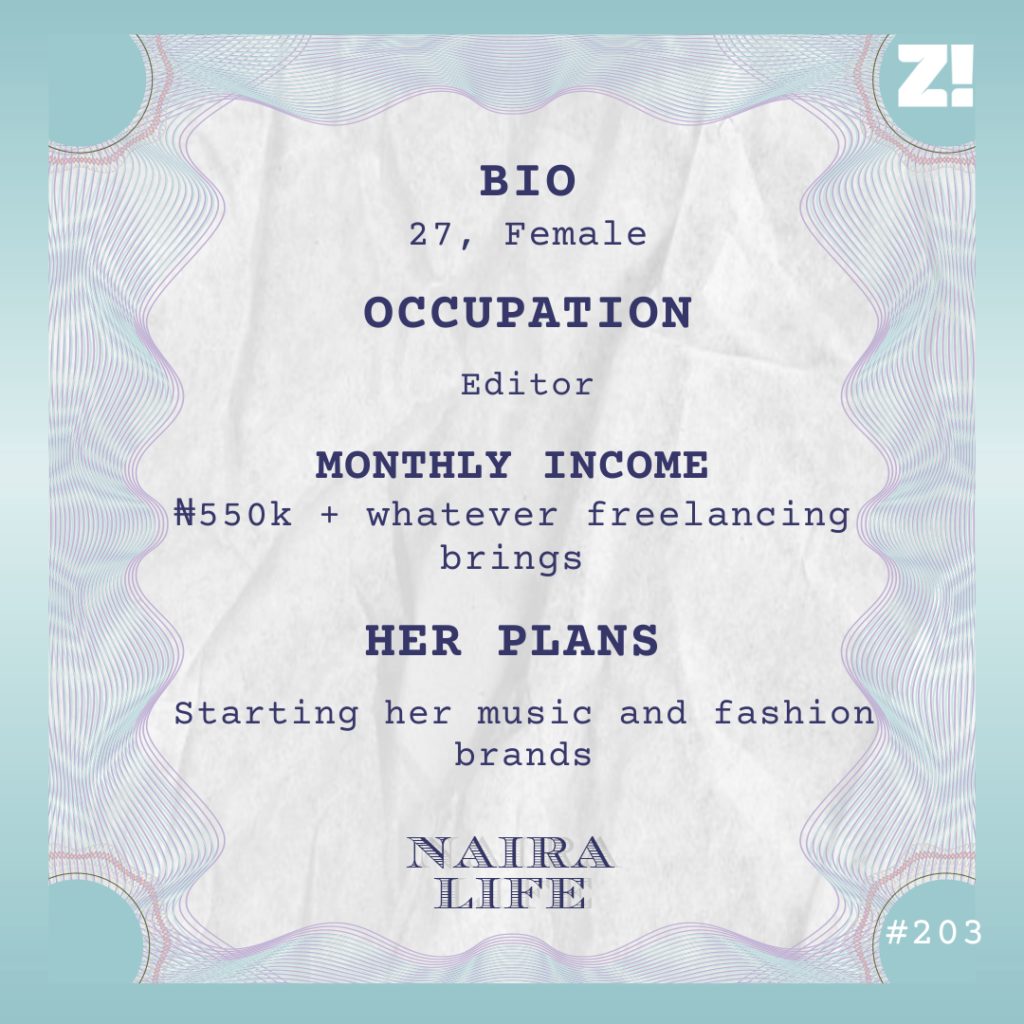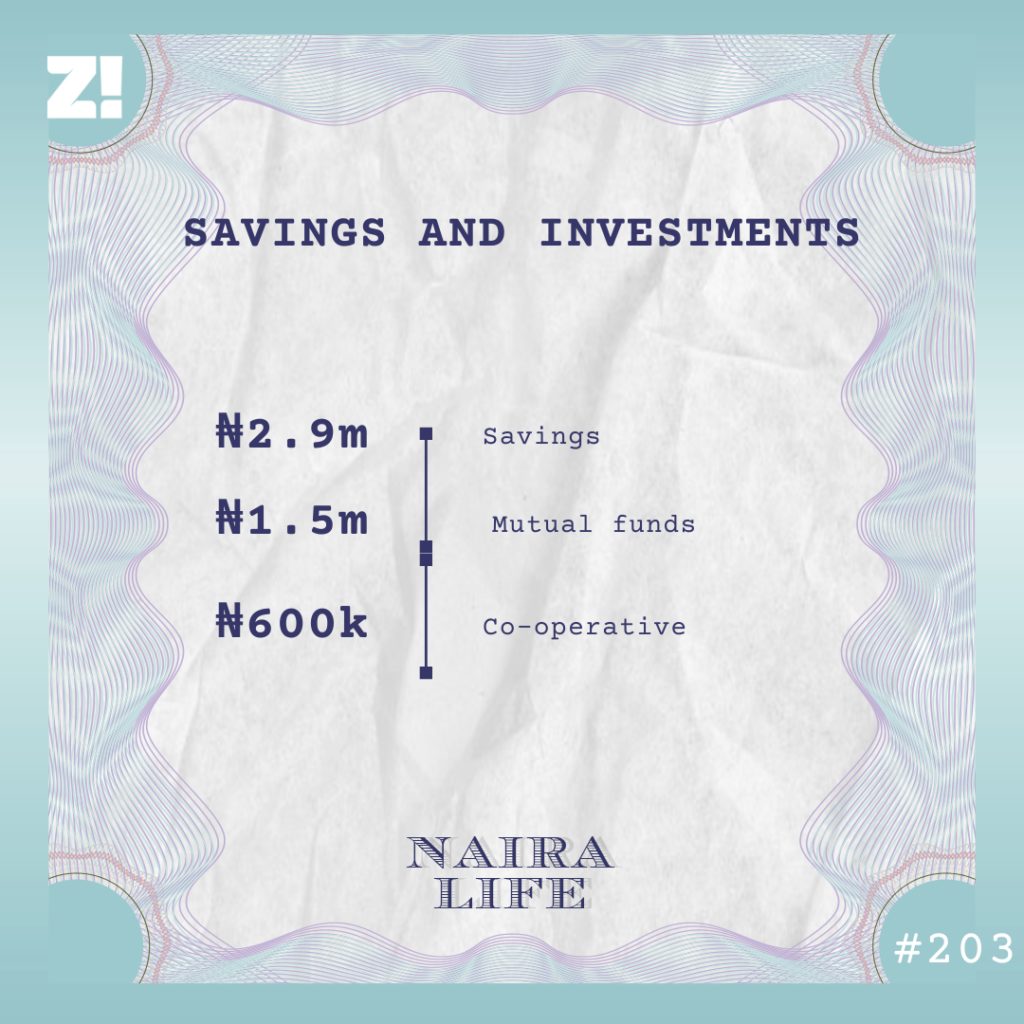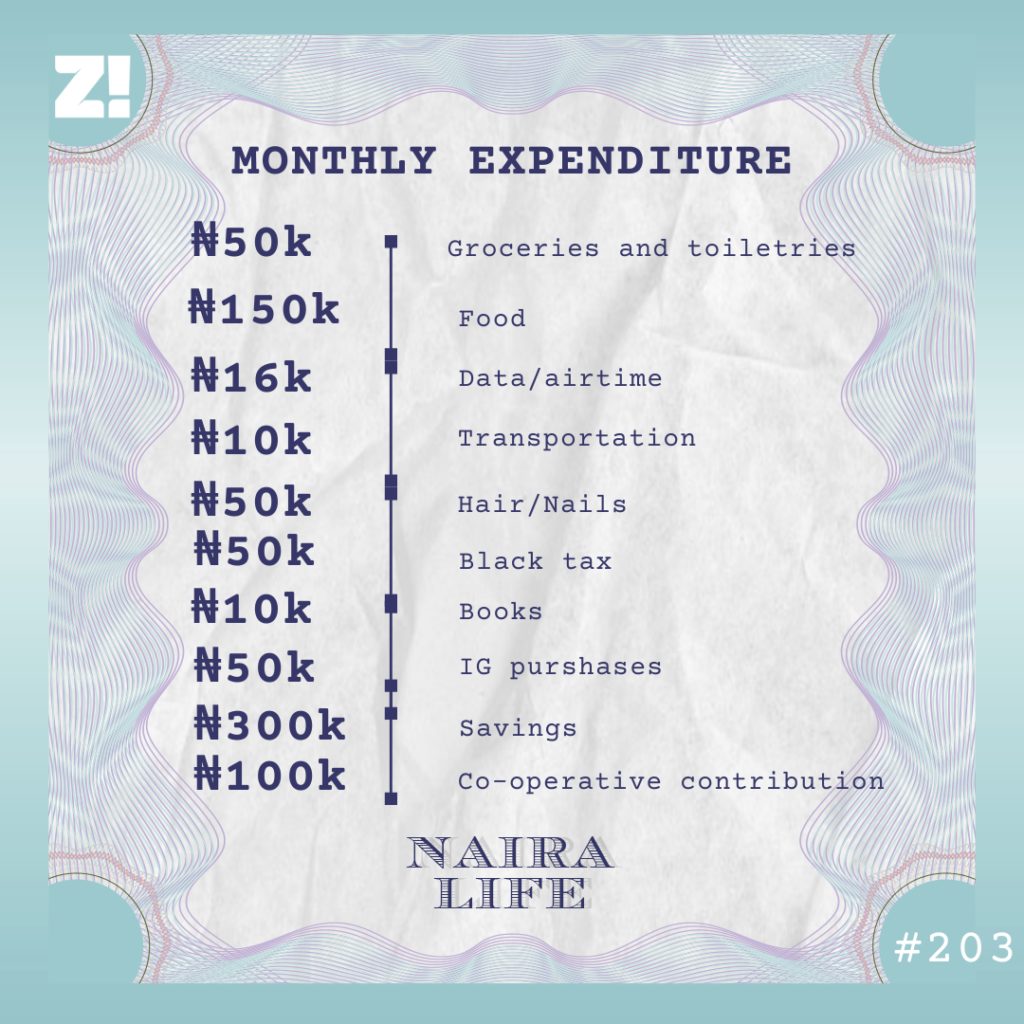Every week, Zikoko seeks to understand how people move the Naira in and out of their lives. Some stories will be struggle-ish, others will be bougie. All the time, it’ll be revealing.
Because she could draw, this week’s #NairaLife subject’s parents thought architecture would be a great fit for her.
In university, she joined the press and media team and, from there, launched her editor career. Now, she’s a musician, looking to start her fashion line.

When was the first time you saw money?
A cousin who owned a bookstore and knew I loved reading gave me a carton of novels to sell to my friends at school in SS 1. I sold two after reading all the books. And from those two, I got maybe ₦500 per book. That was the first time I ever owned money.
SS 1?
Yes. I had no need to own money before then. There was food at home and in school, and a driver dropped me off and picked me up. My parents were very frugal too. They spent on only what was necessary. Like clothes, but only enough clothes, and nothing extra. What else does a 12-year-old need money for?
Why were you 12 in SS 1?
I was getting perfect scores in every subjects so my primary school made me skip classes until I began to get normal scores. I started secondary school at eight.
Scholarstic
Das meee. I waited a year at home after secondary school because I was too young to go to uni, and in 2011 when I turned 16 I was admitted to study architecture.
Why architecture?
As a child, I did a lot of reading, writing, singing and drawing. Towards the end of secondary school, I thought I was going to be a big fashion brand in the future because I was always drawing fashion sketches. My parents noticed this and decided architecture was a great fit.
Don’t kill me. What did you actually want?
No idea. I didn’t know what I wanted. My parents even wanted me to study medicine at first, just because I was smart. Thankfully, UNILAG didn’t accept students below 16 at the time. I eventually went to a private university.
So how was architecture?
I hated it. I was lost and confused in my first year. I didn’t know what I was doing there. It’s like I had this creative energy and didn’t know where to channel it. At some point, I had a panic attack. At another point, I joined a theatre group. I was just looking for something to do.
I experimented a lot more in my second year until I found what worked for me. First, I tried to join the school choir, then I joined an entrepreneurial class, but they were not serious.
Finally, I joined the press and media unit, and for the first time, I found something I liked. I was one of the very few non-mass comm students there, but I didn’t mind. I had to submit a written entry before I was accepted, and immediately, they thought I was great. From then, press and media became my thing. At the press unit, I was getting better at writing and getting heavily involved with administration.
By my third year, I was head of the editorial department, and by my final year, I became the first-ever non-mass comm press secretary of the student council.
Mad. What about school?
I was just drifting through architecture. I faked illnesses so I could miss classes to sleep and watch movies. I knew how to pass exams, so I wasn’t failing out of school. But my lack of interest was so obvious, a lecturer called me aside during my final year studio defence and asked me if I really wanted a career in architecture. Once I told her no, she passed me. I graduated in 2015 with a 2:1.
What happened after uni?
NYSC. The fun part of youth service was that I had the freedom to volunteer for things I was interested in. I wrote drama scripts and acted in plays for an organisation raising awareness for homeless children. That one paid me ₦15k monthly. I also volunteered for WHO as an independent monitor for immunisation campaigns and got ₦6k every weekend I worked.
What did you spend your money on?
French lessons because I wanted to learn a new language, and vocal training because I wanted to become a musician.
Bonjour le masi
Please. I finished NYSC in 2016 and spent the next seven months at home creating music content on social media to see if my music career would take off from there.
Should Asake be worried?
Lmao, no, not yet. By May 2017, my dad got me an editorial assistant job at a comms agency. They paid ₦70k, and I was there until November when a mentor I met through my cousin reached out to ask if I wanted an editorial trainee role with a publishing company. After two meetings with the CEO, they hired me.
How much did they pay?
₦100k.
What was your plan?
I started out as an editorial trainee, but they threw me into two big projects in the first two months, and once they saw I was good at editing and managing clients, they promoted me to editor. No raises though. After two years, I got a raise to ₦150k, and in addition to my primary responsibilities, I also oversaw company events. Then I got promoted to senior editor and another raise to ₦220k.
All this while, I was making music small small and performing at shows for free.
It’s giving growth
LMAO. By mid 2020, almost the entire editorial team had left because the CEO insisted we all came to work immediately after the lockdown, and people weren’t having it. I was also going to leave, but she begged me to stay and offered me the managing editor position with a raise to ₦300k. I took it even though I didn’t want to.
Why?
I had a weird relationship with the CEO. She liked me, but she was not a great boss. Working there was toxic. She was too emotionally attached to the job, and it affected the decisions she made and the way she interacted with us. There was office politics too, and my coworkers weren’t the nicest people. My dad had told me to leave, but the promotion made me stay.
Why did you eventually leave?
I was poached by a media company that saw my LinkedIn. They hired me as a senior editor. It was a demotion from the role I was coming from, but it was more money and, more importantly, freedom from the other job.
How much?
₦350k.
And the working environment?
Much better. Less toxic. It’s a bigger team, but the people are much nicer. And there’s less pressure on me. I had a better work-life balance at the other job, but I can still take on side gigs here.
What side gigs?
I have a contract as an editorial consultant with another publishing company trying to set up. I’m helping them build their structure and network. They pay me ₦200k monthly. I also freelance. I help self-publishing authors edit their books and write statements of purpose, scholarship essays and optimise LinkedIn pages for people trying to japa, and whatever other editorial freelancing jobs I get. Apart from the ₦550k I get from my two stable sources of income monthly, I make between ₦200k and ₦500k extra from freelancing. Sometimes, more.
What does that look like for your finances?
This is what I have right now:

And how do you break down your monthly spendings?

I’m curious about your plans for your career
I’m saving up for two things. First, I want to invest in my music. I want to pay for artist development. I don’t want to be one of those musicians who just wings it. I want to learn how to perform and promote my music. I also want to record a full-length album. This should cost me around ₦8.5m.
Then I want to start a lifestyle brand that retails jewellery, makeup, household items and clothing. I’m already talking to manufacturers in China. I’ll also need money for promotion and marketing. I’m projecting I’ll need between ₦5 and ₦10m to get started.
What do you want right now but can’t afford?
A home studio.
Tell me how financially happy you are on a scale of 1-10
5. Right now, I can afford the basics like food, shelter and clothing, but not the big projects I have planned.




